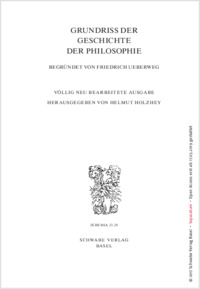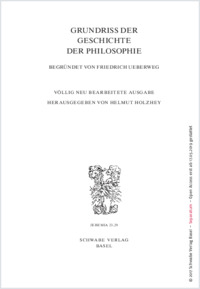Die Zusammenstellung des «Corpus Aristotelicum» und die Kommentartradition
BHAP-PH
- Cordonier, Valérie CNRS, UMR7219, Paris / Université de Fribourg, Suisse
- Pieter De Leemans KU Leuven
- Carlos Steel KU Leuven
- 2017
Published in:
- A. Brungs, V. Mudroch and P. Schulthess (ed.), Grundriss der Geschichte der Philosophie.. - Basel, Schwabe Verlag, 2017. - 2017, vol. Die Philosophie des Mittelalters, Bd 4: 13. Jahrhundert , p. 149-161
Latin Aristotelianism
Aristotelian tradition
Late scholasticism
Aristoteles Latinus
translations of Aristotle from Greek to Latin
Aristotle in the thirteenth century
history of the Corpus Aristotelicum in the Middle Ages
first publication of Aristotles ‘Opera omnia’ in the Latin West
the reception of Aristotle’s Logic
the reception of Aristotle’s works of moral philosophy
the reception of Aristotle’s philosophy of nature
Aristote latin
Arisotélisme latin
Tradition aristotélicienne
Scolastique tardive
Traductions d'Aristote du grec au latin
Aristote au XIIIe siècle
Histoire du Corpus Aristotelicum au Moyen Âge
Première publication des ‘Opera omnia’ d'Aristote dans l'Occident latin
Réception de la logique d'Aristote
Réception des oeuvres morales d'Aristote
Réception de la philosophie de la nature d'Aristote
English
The rediscovery of Aristotle in the Middle Ages is one of the most impor¬tant events in the history of (late) medieval philosophy. The twelfth and thirteenth centuries saw Latin translations of major parts of the Corpus Aristotelicum both from the Greek and the Arabic. Through these transla¬tions, Aristotle, who until then had mainly been known –via Boethius’s translations– as a teacher of logic, became the authority in several oth¬er domains such as metaphysics, ethics, and natural philosophy. This rapid appropriation of Aristotelian thought was stimulated by the rise of Universities in the same period. In this article, the history of the rediscovery of Aristotle in the Middle Ages is explained in the form of a short narrative that covers the (partially arbitrary) period from 1200 to 1300. This article, published in a series that was the most extensive and comprehensive history of philosophy ever published, is the most up-to-date presentation of the subject.
- Faculty
- Faculté des lettres et des sciences humaines
- Department
- Département de Philosophie
- Language
-
- German
- Classification
- Philosophy, psychology
- License
- License undefined
- Open access status
- green
- Persistent URL
- https://folia.unifr.ch/unifr/documents/325571
Other files
Statistics
Document views: 79
File downloads:
- 2017cordonier_deleemans_steeldiezusammenstellungdescorpusaristotelicumunddiekommentartradition2626-8_grundriss_13jh_p-07.pdf: 271
- 2017cordonier_deleemans_steeldiezusammenstellungdescorpusaristotelicumunddiekommentartradition2626-8_grundriss_13jh_p.149-161.pdf: 149

